No, chickens are unlikely to run away if you let them out, as long as you provide a secure and stimulating environment within the yard. Creating a safe and engaging space for your chickens is essential to prevent them from escaping.
While the thought of letting your chickens roam freely may raise concerns about them running away, with the right measures in place, you can successfully let them out without worry. By providing ample space, appropriate shelter, and engaging activities such as perches, dust baths, and foraging areas within the yard, you can keep your chickens content and less inclined to wander.
This article will explore the factors that contribute to chickens running away and provide practical tips on how to keep them safely within your yard. So, let’s dive in and discover how you can ensure your chickens enjoy their freedom without the risk of them running away.
Table of Contents
Creating A Secure Environment
Creating a secure environment for your chickens is crucial to prevent them from running away. By providing ample space, appropriate shelter, and engaging activities within your yard, you can keep your chickens content and less inclined to wander.
Providing Ample Space
Chickens require enough space to move around freely and exhibit their natural behaviors. By providing ample space within your yard, you can prevent them from feeling confined and reduce the likelihood of them attempting to run away. Make sure your chickens have enough room to comfortably roam, scratch, and forage for food.
Providing Appropriate Shelter
Ensuring that your chickens have appropriate shelter is essential for their safety and well-being. A sturdy and predator-proof coop is necessary to protect them from potential dangers. This includes securing the coop with strong wire mesh, closing all entrances and exits at night, and providing proper ventilation. Additionally, consider adding roosting bars and nesting boxes inside the coop to mimic their natural roosting habits and encourage them to stay content and comfortable.
Including Engaging Activities
Chickens are intelligent creatures that require mental and physical stimulation. By including engaging activities within their environment, you can keep them occupied and less likely to wander off. Provide perches or tree branches for them to climb and rest on, as well as dust baths for them to indulge in their natural grooming behaviors. Creating foraging areas with scattered treats or hiding food in treat balls will also keep them entertained and prevent them from feeling the need to explore beyond the safety of your yard.
Remember, while chickens may occasionally stray from their designated area, providing a secure environment with ample space, appropriate shelter, and engaging activities will greatly reduce the chances of them running away. By meeting their natural needs, you can ensure they are happy, content, and less inclined to wander.

Managing Free-Ranging Time
By creating a secure and stimulating environment within your yard and providing ample space, shelter, and engaging activities, you can deter chickens from running away when you let them out. This keeps them content and less inclined to wander too far.
Limiting Free Ranging Time
When it comes to managing free-ranging time for your chickens, it’s important to set limits to ensure their safety and the security of your flock. While chickens love the freedom to roam and forage, allowing them unlimited access to the outdoors can increase the risk of them wandering too far or falling prey to predators.
By implementing a schedule for free-ranging time, such as limiting it to a couple of hours each day or even just a half hour, you can strike a balance between giving your chickens the opportunity to enjoy the outdoors while also keeping them within a safe range.
Determining Safe Time To Let Them Out
One crucial factor in managing free-ranging time is determining the safest time to let your chickens out of the coop. Chickens have poor vision during dusk, dawn, and in the dark, making them more vulnerable to predators lurking in the shadows.
The ideal time to let your chickens out is after the sun is fully up and it is fully “daytime.” By doing so, you can ensure that your flock has better visibility and reduce the risk of predator attacks.
Ensuring They Return To The Coop
One concern many chicken owners have is whether their chickens will return to the coop after being let out to free range. The good news is that, in most cases, chickens have an instinct to stay close to their protected roost and reliable sources of food and water.
To ensure that your chickens come back to the coop, it is essential to provide a well-maintained and secure coop that offers a comfortable and enticing environment for them. Additionally, keeping a consistent and full feeder can help encourage your chickens to return to the coop for their meals.
In conclusion, managing free ranging time for your chickens is crucial for their safety and well-being. By setting limits, determining safe times to let them out, and creating an inviting coop environment, you can enjoy the benefits of free ranging while keeping your flock protected.
Preventing Escape Techniques
Creating a secure and stimulating environment within your yard, such as providing ample space, appropriate shelter, and engaging activities like perches and foraging areas, can help prevent chickens from running away when you let them out. By keeping them content and entertained, they will be less inclined to wander off.
Not Clipping Their Wings
When it comes to preventing your chickens from running away, it may seem counterintuitive, but not clipping their wings is actually a beneficial technique to keep them safe. Clipping their wings may hinder their ability to escape from predators or dangerous situations. Your chickens need their protective reflexes intact in case of any potential threats.
Allowing your chickens the freedom to roam while also ensuring their safety is a delicate balancing act. By not clipping their wings, you give them the ability to fly to higher perches, evading predators that may be lurking in the area. This natural defense mechanism can be crucial for their survival, making it essential to resist the urge to clip their wings.
Building A Well-maintained Coop
One of the most effective ways to prevent your chickens from running away is by providing them with a well-maintained coop. A secure and comfortable coop acts as a safe haven for your feathered friends, discouraging them from venturing too far away.
Ensure that your coop is sturdy and free from any openings or gaps that may allow chickens to escape. Regularly inspect the coop for any signs of wear and tear and promptly address any repairs that may be required. By maintaining a solid coop structure, you create a reliable and secure environment that reduces the chances of your chickens running away.
Keeping A Consistently Full Feeder
A consistently full feeder is an often overlooked but vital element in preventing your chickens from running away. Chickens, like any other living creature, rely on a regular food source to sustain themselves. When they have access to an ample supply of food, they are less likely to wander off in search of sustenance elsewhere.
Ensure that your feeder is always filled with a variety of nutritious chicken feed, allowing your chickens to graze and peck as they please. This not only keeps them content but also satisfies their natural foraging instincts. By consistently providing them with food, you create an environment that encourages them to stay close to their coop and reduces the risk of them running away.
Preventing your chickens from running away is crucial for their safety and your peace of mind. By not clipping their wings, building a well-maintained coop, and keeping a consistently full feeder, you can create an environment that promotes their well-being and reduces the likelihood of escape.

Building A Strong Connection
When it comes to raising chickens, one important aspect to consider is building a strong connection with your feathered friends. Establishing a bond of trust and companionship not only contributes to their overall well-being but also prevents them from running away when you let them out. Here are some key strategies to help you build a strong connection with your chickens:
Spending Time Petting Them
Spending quality time with your chickens, including regular petting sessions, is a great way to develop a bond and earn their trust. Chickens enjoy physical contact, so make sure to approach them calmly and gently. Slowly stroke their feathers, paying attention to their body language to ensure they are comfortable and at ease. Engaging in this tactile interaction not only helps to establish trust, but it also allows you to observe any signs of distress or health issues.
Establishing Trust And Bonding
Building trust is essential for a strong connection with your chickens. To establish trust, create a routine by consistently providing their basic needs such as food, water, and a clean coop. Chickens thrive on predictability, so a consistent schedule creates a sense of security. Additionally, approach your chickens calmly and avoid sudden movements or loud noises that might startle them. By creating a calm and safe environment, your chickens will learn to trust you and be more inclined to stay close.
Proper Socialization And Handling
Proper socialization and handling are crucial for developing a strong bond with your chickens. Gradually introduce them to different environments, people, and stimuli to help them adapt and feel comfortable in various situations. Handle them gently and with care, using proper techniques that minimize stress. Regular gentle handling helps your chickens become accustomed to human interaction, making them less likely to run away when they are let out.
Remember, every chicken is unique. Some may be naturally more adventurous while others may be more cautious. Take the time to understand their individual personalities and adjust your approach accordingly. Building a strong connection with your chickens through petting, trust-building, and proper socialization is key to preventing them from running away when they are let out to roam.
Understanding Chicken Behavior
Allowing chickens to freely roam in a safe and secure environment can help prevent them from running away. Providing adequate space, shelter, and engaging activities within the yard keeps chickens content and less inclined to wander.
Understanding Chicken Behavior
Chickens are fascinating creatures with unique behaviors that can sometimes leave their owners wondering if they will run away when let out. To comprehend their actions, it’s essential to delve into the factors that influence their loyalty and the reasons why they might choose to wander off. Whether you have rehomed chickens or are contemplating letting your flock explore the great outdoors, understanding their behavior can help you make informed decisions. Let’s take a closer look at the various aspects that shape chicken behavior and determine if they are prone to running away.
Reasons Why Chickens Might Run Away
Chickens, although domesticated, hail from a lineage of wild birds. This ancestry plays a significant role in their instinctive behaviors. Some reasons why chickens might run away include:
Factors That Influence Their Loyalty
While chickens can exhibit a propensity to wander, several factors play a role in their loyalty and likelihood to run away. These include:
Rehomed Chickens And Their Behavior
Rehomed chickens, particularly those transitioning to a new environment, may exhibit different behaviors compared to those raised from chicks. They might initially be disoriented and disassociated from their new surroundings. It’s crucial to give them time to acclimate and establish a sense of familiarity before allowing them to roam freely. Gradually introducing them to their new home and providing a secure, enticing yard can help minimize their desire to run away and encourage them to feel settled.
Understanding chicken behavior is essential in ensuring the safety and welfare of your flock. By comprehending the reasons why chickens might run away, the factors that influence their loyalty, and the behavior of rehomed chickens, you can make informed decisions about whether to let them out and how to create a secure environment that keeps them content and close to home.
Frequently Asked Questions For Will My Chickens Run Away If I Let Them Out
How Do I Keep My Chickens From Running Away?
To prevent chickens from running away, create a secure and engaging environment in the yard. Provide ample space, appropriate shelter, perches, dust baths, and foraging areas. This keeps chickens content and less likely to wander. Avoid letting them out during dusk or dawn when predators are active.
Can I Let My Chickens Run Free?
To prevent your chickens from running away, provide a secure and stimulating environment with ample space, appropriate shelter, and engaging activities within the yard. Limit their free-ranging time to a few hours each day to ensure they don’t wander too far.
How Long After Getting Chickens Can You Let Them Out?
Chickens can be let out after a few weeks of getting them. Ensure the area is secure and stimulating to prevent them from running away. Limit their free range time to a couple of hours to prevent wandering too far.
It’s safe to let them out after the sun is fully up.
What Time Is It Safe To Let Chickens Out?
It is safe to let chickens out after the sun is fully up. Chickens have poor vision in low light and predators tend to be more active during dusk, dawn, and darkness. As long as it is daytime, you can let your chickens out without worry.
Conclusion
Allowing your chickens to roam freely does not necessarily mean they will run away. By creating a secure and stimulating environment within your yard, you can keep your chickens content and less inclined to wander. Providing ample space, appropriate shelter, and engaging activities such as perches, dust baths, and foraging areas can help deter chickens from escaping.
Ensuring their wings are not clipped will allow them to utilize their protective reflexes to escape predators. Remember, a well-maintained coop and a consistently full feeder are key to keeping your chickens close by.


![Terrifying Trend: Why Do Roosters Chase Humans? [2024]](https://plantsandchickens.com/wp-content/uploads/2024/02/why-do-roosters-chase-humans-4.webp)


Leave a Reply